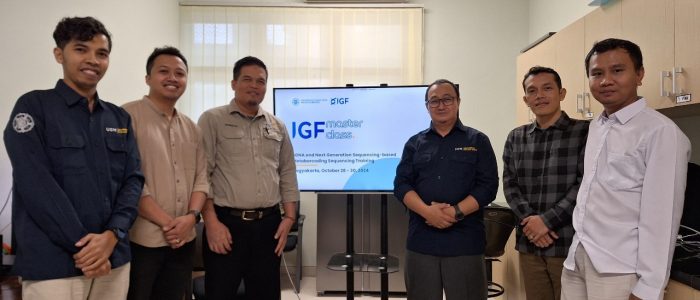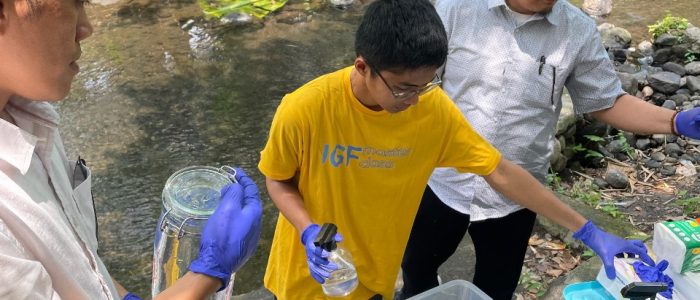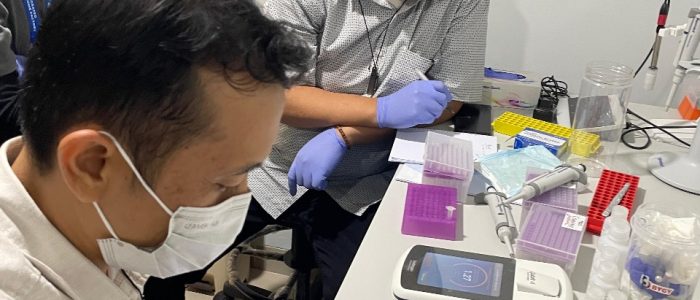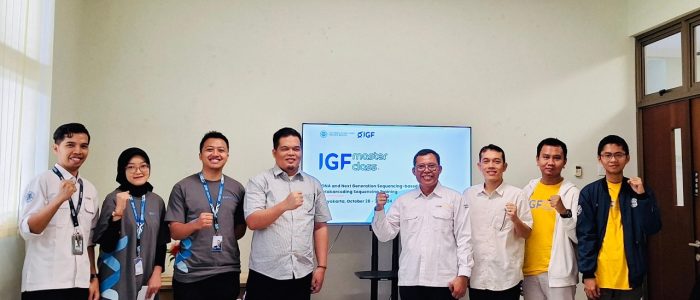As a mega biodiversity country, Indonesia possesses extensive biological resources that hold significant potential not only for bioprospecting but also for biodiversity monitoring research. Distribution and biodiversity have become key indicators of environmental quality. With the advent of next-generation sequencing (NGS) technologies, biodiversity monitoring can now leverage environmental DNA (eDNA), facilitating rapid and comprehensive community assessments. This approach enables the detection of a wide range of taxa, including not only conventionally sampled flora and fauna but also microbial communities that remain unculturable through traditional methods.
As part of its commitment to advancing research capacity, the Integrated Genome Factory (IGF) recently hosted the IGF MasterClass, a specialized training in eDNA metabarcoding for researchers from Universitas Sriwijaya. Held from October 28 to 30, 2024, at the Faculty of Biology, Universitas Gadjah Mada (UGM), Yogyakarta, the event commenced with an opening address by Dr. Slamet Widiyanto, S.Si., M.Sc., Vice Dean for Finance, Assets, and Human Resources at UGM’s Faculty of Biology. Dr. Dwi Sendi Priyono, S.Si., M.Si., the Master Trainer, initiated the training with an in-depth introduction to eDNA theoretical foundations. The first day included field-based eDNA sampling techniques, led by Assistant Andryan, followed by DNA extraction and PCR sample preparation conducted by Adhisa F. P., S.Si., and Ashfiya Hanif, S.Si.
Once participants mastered rigorous sampling methodologies and acquired high-quality samples, IGF personnel guided them through hands-on library preparation workflows on the second day. This session was designed to prepare participants for metabarcoding sequencing using the Nanopore platform. The participants engaged enthusiastically, actively participating in each step of the training process.
On the third day, the focus shifted to the data interpretation necessary for accurate metabarcoding analysis. Dr. Dwi Sendi Priyono, S.Si., M.Si., led sessions on Nanopore software operation, data refinement, processing, and best practices for achieving publication-standard representation of sequencing data. Dr. Eko Agus Suyono, M.App.Sc., Vice Dean for Research, Community Engagement, Cooperation, and Alumni at UGM’s Faculty of Biology, concluded the event, expressing hope that the training outcomes would be directly applied by the researchers in their respective institutions and foster future collaborations with IGF and the Faculty of Biology at UGM.
“This training was exceptional. The materials were presented effectively by the young, experienced trainers, making complex concepts accessible,” commented Dr. Melki, S.Si., M.Si., at the session’s close.
IGF and the Faculty of Biology UGM are committed to enhancing research capacity and collective action to conserve Indonesia’s biological diversity by advancing genomics technology through the Nanopore sequencing platform. The IGF, equipped with ONT PromethION 24 and a Data Acquisition Unit (DAU) capable of processing up to 720 Gb of DNA sequencing daily, is well-positioned to offer high-throughput sequencing services and collaborative opportunities with institutions across Indonesia.




